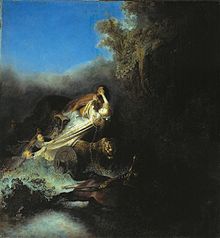- Claudian
-
 Works of Claudius Claudianus - German translation by Georg Freiherr von Wedekind, 1868
Works of Claudius Claudianus - German translation by Georg Freiherr von Wedekind, 1868
Claudian (lat. Claudius Claudianus) was a Roman poet, who worked for Emperor Honorius and the latter's general Stilicho.
A Greek-speaking citizen of Alexandria and probably not a Christian convert, Claudian arrived in Rome before 395. He made his mark with a eulogy of his two young patrons, Probinus and Olybrius, thereby becoming court poet. He wrote a number of panegyrics on the consulship of his patrons, praise poems for the deeds of Stilicho, and invectives directed at Stilicho's rivals in the Eastern court of Arcadius. These efforts resulted with such gifts as the honor of the rank of vir illustris, a statue, and a rich bride selected by Stilicho's wife, Serena.
Despite his Greek origins, Claudian wrote in Latin and is one of the best late users of the language in poetry. Critics consider Claudian a good poet, if not absolutely first-rate. He is elegant, tells a story well, and his polemical passages are occasionally unmatchable in sheer entertaining vitriol; but his writing is tainted by preciousness, a flaw of the literature of his time, and his being extraordinarily cold and unfeeling.
From a historical standpoint, Claudian's poetry is a valuable, however distorted, primary source for his period. Since his poems do not record the achievements of Stilicho after 404, scholars assume he died in that year. The historical or political poems connected with Stilicho have a separate manuscript tradition to the rest of his work, and this is believed to indicate that they were published as a separate collection, perhaps by Stilicho himself after Claudian's death.
His most important non-political work is an unfinished epic, De raptu Proserpinae, whose three extant books are believed to have been written in 395 and 397.
Works
- Panegyricus dictus Probino et Olybrio consulibus
- De raptu Proserpinae (unfinished epic, 3 books completed)
- In Rufinum ("Against Rufinus")
- De Bello Gildonico ("On the Gildonic revolt")
- In Eutropium ("Against Eutropius")
- Fescennina / Epithalamium de Nuptiis Honorii Augusti
- Panegyricus de Tertio Consulatu Honorii Augusti
- Panegyricus de Quarto Consulatu Honorii Augusti
- Panegyricus de Consulatu Flavii Manlii Theodori
- De Consulatu Stilichonis
- Panegyricus de Sexto Consulatu Honorii Augusti
- De Bello Gothico ("On the Gothic War" of 402-403)
- Lesser poems: Phoenix, Epithalamium Palladio et Celerinae; de Magnete; de Crystallo cui aqua inerat
See also
References
- ^ Amy Golahny, "Rembrandt's Abduction of Proserpina," in The Age of Rembrandt: Studies in Seventeenth-Century Dutch Painting (Penn State Press, 1988), pp. 31ff.
External links
Editions
- Complete Latin text and English translation (Platnauer, 1922 at LacusCurtius)
- Critical edition, Latin (Michael Hendry)
- Claudianus, Der Raub der Proserpina, hg. Thomas Baier and Anne Friedrich (Darmstadt: WBG (Wissenschaftliche Buchgesellschaft), 2009) (Edition Antike).
Secondary sources
- Resources for the Study of Claudian (Bret Mulligan)
Categories:- Roman era poets
- Late Antique writers
- Late Antique Latin-language writers
- 404 deaths
- 4th-century poets
Wikimedia Foundation. 2010.

